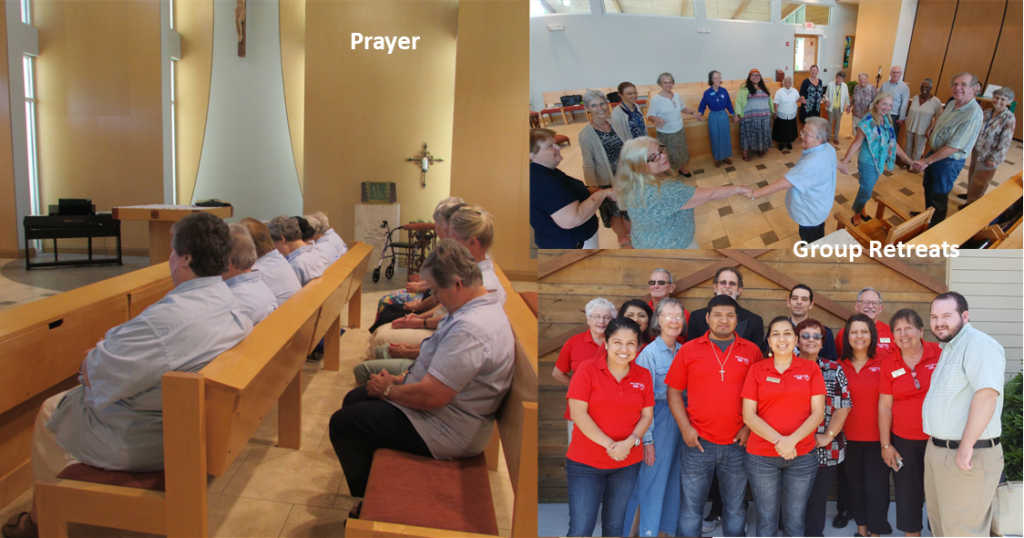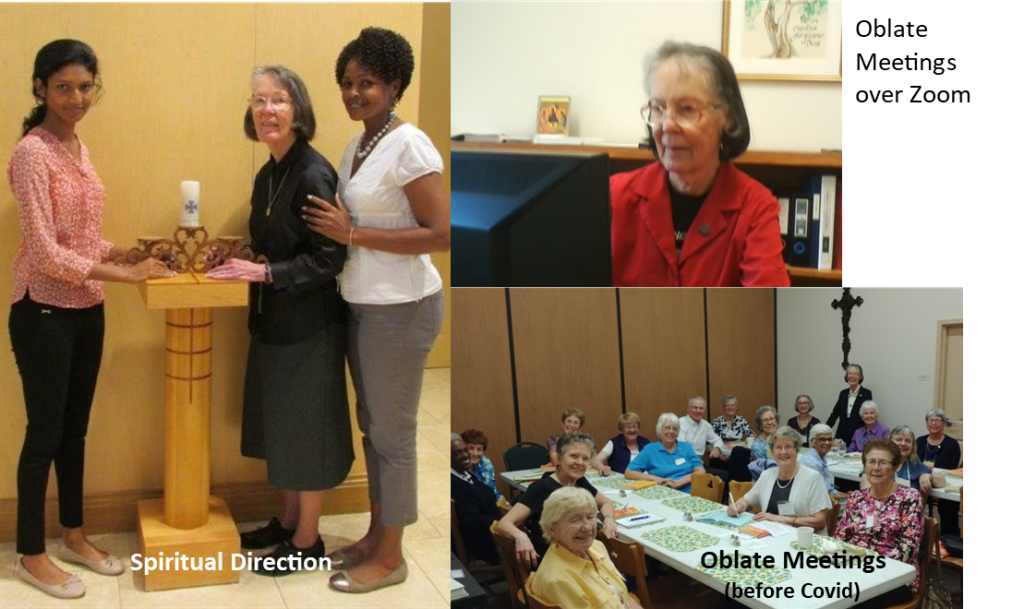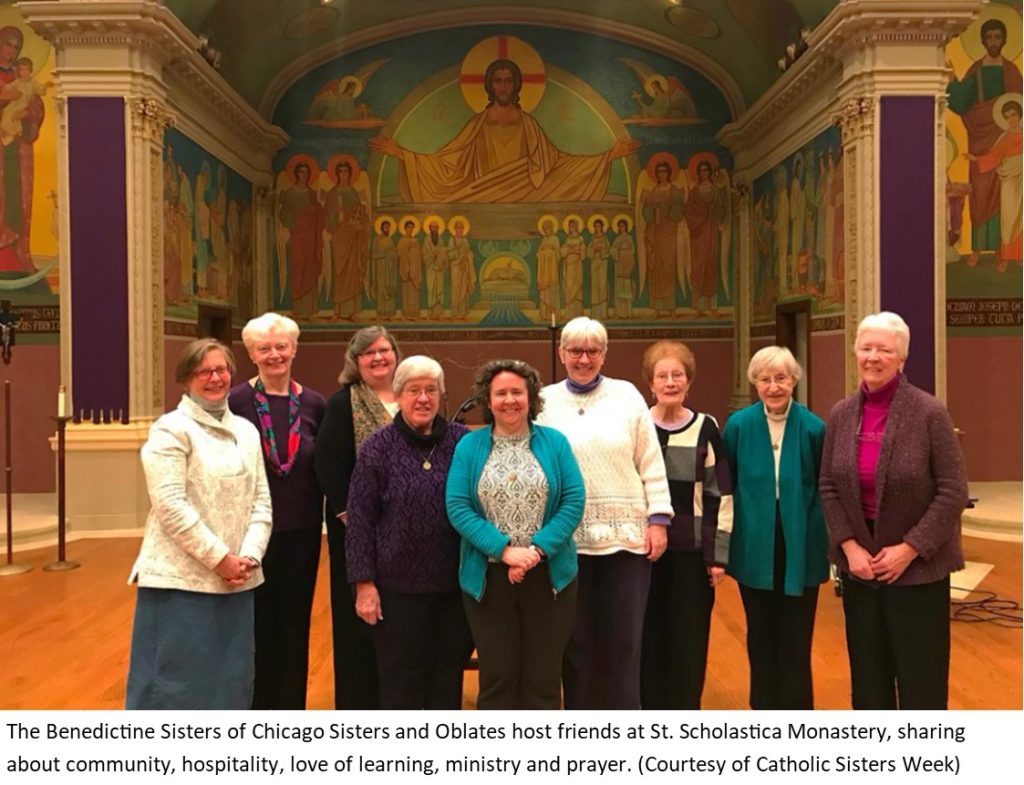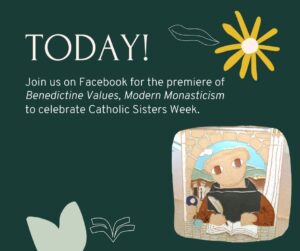Catholic Sisters Week
Catholic Sisters Week
9th Annual Catholic Sisters Week
will celebrate work women religious do today
March 3, 2022
by Dan Stockman
Catholic Sisters Week – March 8-14, 2022
Thanks to the ongoing COVID-19 pandemic, many activities planned for the ninth annual Catholic Sisters Week will again take place online.
But this year’s virtual events, which begin March 8, International Women’s Day, and run through March 14, are more interactive than last year’s: Rather than simply observing an event taking place at a convent or motherhouse, many of this year’s events are about getting participants involved in the work sisters do.
Stacy Spitler, director of communications for the Dominican Sisters of Grand Rapids, Michigan, and chair of the Communicators for Women Religious committee overseeing Catholic Sisters Week, said organizers have worked to ensure events are not only about the legacy of sisters’ work, but what they do today.
the Communicators for Women Religious committee overseeing Catholic Sisters Week, said organizers have worked to ensure events are not only about the legacy of sisters’ work, but what they do today.
“Let’s take down the walls and engage with the charism and ministries and love that vowed sisters bring to the world,” Spitler said. “Sisters are always about welcome and invitation, and I think Catholic Sisters Week is a call to the world to take a moment and pay attention to the wisdom and the experience and the inspiration sisters offer.”
The theme for this year is “Caring for Earth, Caring for You,” and Spitler said many events are incorporating an environmental focus or aspects of Pope Francis’ 2015 encyclical “Laudato Sí‘ on Care for Our Common Home.”
“Sisters have been caring for our Earth and caring for creation throughout their lifetimes,” she said.
The Amityville Dominicans will use the week to have participants join an eco-challenge aimed at reducing plastic waste by purchasing products with minimal or no plastic packaging and switching to reusable water bottles, utensils and bags. Similarly, Region IV of the Leadership Conference of Women Religious is getting participants involved in caring for the Earth with “events, prayers, calls to action, social media campaigns, and more.” And the Sisters of Charity of Nazareth, Kentucky, are inviting participants to join a virtual walking tour of Louisville that traces the highlights of the congregation’s co-founder, Mother Catherine Spalding.
Catholic Sisters Week also brings the final episode of “Exploring Intersections: Catholic Sisters on Racism, Migration and Climate,” a project of LCWR’s Region 10. For a year, the monthly program has explored the issues of racism, migration and climate and how they are intertwined. The March 9 episode, “Navigating the Road Ahead,” will focus on takeaways from the series and suggestions for continuing the conversation.
As always, there are “come and see” events and discussions about vocations and discernment opportunities, but Ginny Hizer, executive director of Communicators for Women Religious, which has overseen Catholic Sisters Week since 2020, said engaging with sisters does not have to be part of a recruiting effort.
“One of the things Catholic Sisters Week embraces this year is the concept of being engaged in the work,” Hizer said. “It’s taking the flavor and the mission of the sisters and actually living it out.”
While laypeople are increasingly involved in the work of sisters through sponsored ministries and associate programs, Catholic Sisters Week opens those opportunities to a much broader audience, Hizer said.
“It allows everybody to participate and be part of that work,” she said.
The week’s events also include at least three food drives, a virtual Celtic tea, and an invitation to join the Benedictine Sisters of Mount St. Scholastica for compline, or evening prayer. See all Catholic Sisters Week events.
“Catholic Sisters Week opens up many invitations to engage in contemplative study with sisters. You’ll find webinars, liturgy celebrations,” Spitler said. “Vocation is a piece of this, obviously, but it’s also an opportunity for people to engage with the sisters in many different ways, both virtually and in person.”
She said the engagement Catholic Sisters Week offers this year is especially important after two years of pandemic restrictions and the social isolation it has caused: Even as restrictions have eased, many people feel lost or alone, unable to connect with others and unsure of whether it’s even safe to connect.
“Sisters are better than anybody at finding the hope and holding the hope and recognizing the abundance that surrounds our lives. If you want to experience a bit of that abundance, look to Catholic Sisters Week,” she said. “You can get out of the dark, yucky, cold winter and get some motivation and a reminder of where our faith comes from.”
 ~by Dan Stockman
~by Dan Stockman
Dan Stockman is national correspondent for Global Sisters Report.
Continue ReadingMarch: Celebrating Women’s Accomplishments
Saint Hildegard of Bingen
 Saint Hildegard, a Benedictine abbess, lived in the early 1100s. She was a German writer, philosopher, composer, mystic and visionary. Her interests, research and letters represented a broad spectrum from mathematics, science and medicine to the arts (notice she is pictured here with four other saints, holding a pen and book). She is one of very few proclaimed women of the medieval period. In fact Hildegard is one of just four women to be named a Doctor of the Church, a title given by a pope to saints who have made exceptional contributions to Catholic theology and doctrine. Her feast day is September 17th.
Saint Hildegard, a Benedictine abbess, lived in the early 1100s. She was a German writer, philosopher, composer, mystic and visionary. Her interests, research and letters represented a broad spectrum from mathematics, science and medicine to the arts (notice she is pictured here with four other saints, holding a pen and book). She is one of very few proclaimed women of the medieval period. In fact Hildegard is one of just four women to be named a Doctor of the Church, a title given by a pope to saints who have made exceptional contributions to Catholic theology and doctrine. Her feast day is September 17th.
Hildegard wrote extensively about Saint Benedict’s Rule and Lent. From Sister Andrea Westkamp, a member of Saint Benedict Monastery in Bristow, Virginia, we share her reflection of one of Hildegard’s Lent reminders. Sister Andrea talks about pondering on the heart and Benedict’s words that we need to listen with the ear of our heart. She refers to Hildegard’s idea that Lent would be different if we practiced to listen with the heart:
O, You who are ever
giving life to all life,
moving all creatures,
root of all things,
washing them clean,
wiping out their mistakes,
healing their wounds,
You are our true life,
luminous, wonderful,
awakening the heart
from its ancient sleep.
Sister Andrea continues: “Listening with the heart ‘awakens the heart from its ancient sleep.’ God offers life. According to Hildegard, God also washes us, forgives our sins. God heals our wounds. The ‘ancient sleep’ is Hildegard’s metaphor of a life lived without reflection, faith or awareness of God’s presence. She reminds us that God continues to give us life, to change our lives. Is it any wonder that she was a composer, praising her God for having touched her life?”
Continue Reading
That in All Things God May Be Glorified
 The Benedictine Sisters of Florida respond to the needs of the community in multiple ways. While we are more conscious now more than ever about food insecurity due to the coronavirus crisis, one of our ongoing ministries is running the local food bank and thrift shop, Daystar Hope. One of our Sisters, Sister Jean Abbott, is the executive director and other Sisters volunteer to ensure those in need have access to food, clothing and other necessary items for living. For the past several years, 8 to 10 tons of food have been distributed monthly. Once Covid hit, all the food distribution centers closed. Daystar quickly reopened knowing the intensity of the need. We network to obtain donations from individuals, churches, stores and various groups to add to what the USDA provides.
The Benedictine Sisters of Florida respond to the needs of the community in multiple ways. While we are more conscious now more than ever about food insecurity due to the coronavirus crisis, one of our ongoing ministries is running the local food bank and thrift shop, Daystar Hope. One of our Sisters, Sister Jean Abbott, is the executive director and other Sisters volunteer to ensure those in need have access to food, clothing and other necessary items for living. For the past several years, 8 to 10 tons of food have been distributed monthly. Once Covid hit, all the food distribution centers closed. Daystar quickly reopened knowing the intensity of the need. We network to obtain donations from individuals, churches, stores and various groups to add to what the USDA provides.
For 24 years the Sisters have provided a Thanksgiving Day dinner for the poor and those alone. A sit-down dinner is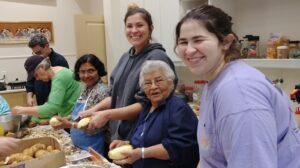 held at Saint Anthony of Padua’s parish hall on the day with all the trimmings for 250 to 300 guests. Along with our faithful volunteers, we also deliver meals to those who are home-bound. The night before Thanksgiving is fun as we gather with volunteers to peel 125 pounds of potatoes!
held at Saint Anthony of Padua’s parish hall on the day with all the trimmings for 250 to 300 guests. Along with our faithful volunteers, we also deliver meals to those who are home-bound. The night before Thanksgiving is fun as we gather with volunteers to peel 125 pounds of potatoes!
Of course the 2020 event had to be cancelled due to Covid. However, perseverance prevailed and we partnered with the Knights of St. Mark the Evangelist parish and First Presbyterian Church, Dade City to provide special food baskets. God is good.
Continue Reading
Are you “braver than most or else just silly?”
Today we get a different, maybe a little amusing image of Jesus – Jesus the housekeeper. How do you know when it’s time to clean house, to clean your space? Maybe you’ve become aware that the cup supply in the dining room is getting low and you come to the realization that YOU know where the missing cups are. Or you’ve had that library book on your desk for a year or more. Or what about the stack of valuable handouts from 2014? Or your laundry hamper won’t hold one more sock. Or there are enough dust bunnies under your bed to help God create another person from dust. And, what about your Lenten resolutions? Are they the same ones you’ve recycled year after year or do you discern the signs of the times and sweep with Jesus’ “whip of cords”?
 This story from John’s Gospel is about a day when Jesus did some housecleaning in the temple. It’s a pretty famous story, they say, of Jesus’ anger yet none of the gospel writers actually use the word “anger.” The word used translates closer to “consumed with zeal.” And have you noticed when the evangelists speak of this and similar occasions nobody else seems to be upset. Jesus is the only one who’s acting out. And when the crowd, his naysayers are riled up, Jesus remains unruffled. John really doesn’t say Jesus was angry. He says his disciples recalled the scripture verse: “Zeal for your house will consume me.”
This story from John’s Gospel is about a day when Jesus did some housecleaning in the temple. It’s a pretty famous story, they say, of Jesus’ anger yet none of the gospel writers actually use the word “anger.” The word used translates closer to “consumed with zeal.” And have you noticed when the evangelists speak of this and similar occasions nobody else seems to be upset. Jesus is the only one who’s acting out. And when the crowd, his naysayers are riled up, Jesus remains unruffled. John really doesn’t say Jesus was angry. He says his disciples recalled the scripture verse: “Zeal for your house will consume me.”
What can we learn from this? First, we have to understand that anger is an automatic response that rises up in us. Rightly directed anger can serve a good purpose; it’s a call for change. If we stuff our anger, and blow up later at someone who has no clue what set us off, who’d want to be our friend? You won’t find a proverb in Scripture; and nowhere in the Rule of Benedict does it say: “Don’t get angry.” One of Benedict’s Tools of Good Works tells us: “do not act in anger” and in the Prologue he cautions: Keep your tongue free from vicious talk and your lips from all deceit … let peace be your quest and aim.”
To understand Jesus’ action that day in the temple, it helps to have an understanding of how important motivation is. It was not wrong for the merchandisers to sell animals and doves. Nor was it wrong to change money. That was helpful to the people who came unprepared to the temple. They’d grown to depend on the availability of such services. Much like people today have come to expect businesses to take credit/debit, on-line payments. Sit up and take notice: no one stopped Jesus when he used his whip of cords: not the temple guards, not the priests, not the sellers, not the buyers, not anyone. And the Gospel writer doesn’t say Jesus did bodily harm to anyone. He overturns tables, He spills the money and He swings the whip of cords and scatters THINGS.
Everyone present, except maybe the disciples, seem to overlook the display. They’re like a child who has witnessed the fury of a disappointed parent. Then reaches out to take mom’s hand, looks up calmly and asks: “So, Mom, are we still going to McDonald’s?” The Jews do ask, “What sign can you show us for doing this?” The disciples must have shaken their heads in amazement. What does that have to do with what just happened???” They’d remember later, when Jesus was raised from the dead, what he had said on this occasion. But for today, all the Jews wanted to know was by what authority Jesus interrupted the activity in the temple. They didn’t ask why Jesus cleansed the temple because they knew they were guilty of wrong-doing.
John tells us in the days after Jesus display of authority, many began to believe in his name. But still he did not trust Himself to them. It is to us that He entrusts Himself, in Word and Sacrament. He trusts us to act in moral outrage against injustice, abuse and violence. To pay attention to the needs around us, of God’s people. To be aware when are we asked for action beyond a petition at Mass. When He asks, will we be ready for action? Will He find cause to do some clearing and cleaning?
In one of the Narnia chronicles by CS Lewis’ The Lion, the Witch, and the Wardrobe, the story reminds us that the divine-human struggle is neither tidy nor tame, but it is nonetheless one that we can live with in confidence. The story’s characters, Susan and Lucy, ask Mr. and Mrs. Beaver to describe Aslan (Lewis’ representation of Jesus). They ask if Aslan is a man. Mr. Beaver replies, “Aslan a man? Certainly not. I tell you he is the King of the wood and the son of the great Emperor-beyond-the Sea. Don’t you know who is the King of Beasts? Aslan is a lion — the Lion, the great Lion.” “Ooh!” said Susan. “I’d thought he was a man. Is he — quite safe? I shall feel rather nervous about meeting a lion.” “That you will, dearie, and make no mistake,” said Mrs. Beaver, “if there’s anyone who can appear before Aslan without their knees knocking, they’re either braver than most or else just silly.”
divine-human struggle is neither tidy nor tame, but it is nonetheless one that we can live with in confidence. The story’s characters, Susan and Lucy, ask Mr. and Mrs. Beaver to describe Aslan (Lewis’ representation of Jesus). They ask if Aslan is a man. Mr. Beaver replies, “Aslan a man? Certainly not. I tell you he is the King of the wood and the son of the great Emperor-beyond-the Sea. Don’t you know who is the King of Beasts? Aslan is a lion — the Lion, the great Lion.” “Ooh!” said Susan. “I’d thought he was a man. Is he — quite safe? I shall feel rather nervous about meeting a lion.” “That you will, dearie, and make no mistake,” said Mrs. Beaver, “if there’s anyone who can appear before Aslan without their knees knocking, they’re either braver than most or else just silly.”
After the cleansing of the temple entryway Jesus disappeared for a few hours. The witnesses might have lost some sleep trying to figure out the meaning of it, but they set out once again looking for him – asking for more signs and looking for miraculous bread. Jesus tells them there will be no more signs. It’s time to wake up and “read the signs.”
~Reflection by Sister Roberta Bailey, OSB, Prioress
March 8th – 12th is Catholic Sisters Week.
Kindly remember us in your thoughts and prayers.
First Reading Exodus 20:1-17 Second Reading 1 Corinthians 1:22-25
Gospel Reading John 2:13-25
Continue ReadingBenedictine Values – Modern Monasticism
Benedictine Values – Modern Monasticism.
A video project that various Benedictine communities have put together
for Catholic Sisters Week 2021.
You can also click on the link below to view the video.


